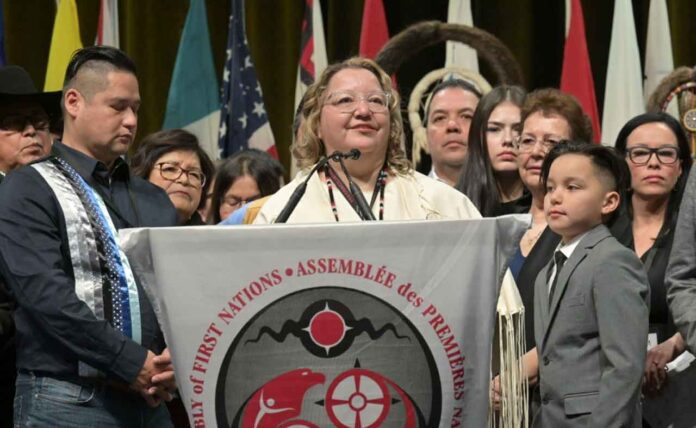OTTAWA – While welcoming some new investments, the Assembly of First Nations (AFN) National Chief Cindy Woodhouse Nepinak said the 2024 Federal Budget falls short of addressing the urgent and long-term needs identified by First Nations.
“Although I am pleased to see continued funding that supports First Nations and new funding to advance their jurisdiction over child welfare and new investments in business loan guarantees, the allocations for housing and infrastructure are insufficient to meet to the government’s promise to close the gap by 2030,” said National Chief Woodhouse Nepinak. “I look forward to meeting with Prime Minister Justin Trudeau and Finance Minister Chrystia Freeland to ensure that First Nations priorities are not just recognized but fully funded.”
The budget outlines over $9 billion in new funding for Indigenous Peoples across five years, including $2.95 billion for the 2024-25 fiscal year. Key investments include:
- Nearly $2 billion for health, mental health, and combating anti-Indigenous racism in healthcare.
- $918 million dedicated to Indigenous housing and infrastructure.
- $467.5 million over five years for policing.
- Nearly $2 billion to support exercising jurisdiction under the Act respecting First Nations, Inuit, and Metis children, youth, and families.
- $225 million over five years, with an ongoing $13 million per year, for language initiatives.
- $5 billion for the Indigenous Loan Guarantee.
A recent report released by the AFN, titled “Closing the Infrastructure Gap,” reveals that over $349 billion is required to meet the 2030 target. Additionally, this month, Canada’s Auditor General released two reports detailing a distressing and persistent patterns of failure in federal First Nation housing and policing programs.
“The allocations in Indigenous housing and infrastructure are critically less than the $350 billion required to close the housing and infrastructure gap among First Nations,” said Newfoundland and Labrador Regional Chief Brendan Mitchell. “Similarly, the absence of long-term, dedicated funding for First Nations and lack of inclusion of First Nations in national initiatives, such as the Canada Housing Infrastructure Fund, is alarming. Canada’s failure to consult with First Nations in the planning and execution of these programs and the lack of progress in resolving the housing crisis is unacceptable. Safe and adequate housing is not just a necessity but a fundamental human right. It’s time for Canada to step up and make substantial investments in this area before the infrastructure gap becomes even greater.”
National Chief Woodhouse Nepinak concluded, “While we welcome the investments in policing, without changes to the First Nations Inuit Policing Program (FNIPP) and the introduction of legislation that recognizes First Nations jurisdiction over policing, First Nations will continue to face barriers, putting their communities at-risk.”
The AFN participated in the pre-budget submission process and outlined specific asks in a number of priority areas, aiming to address urgent and long-term needs and funding requirements, as identified by First Nations. Read more here: 2024 AFN Pre-Budget Submission.

